Nodal Body Says Govt Overlooking Auto LPG Sector
- By MT Bureau
- January 28, 2022
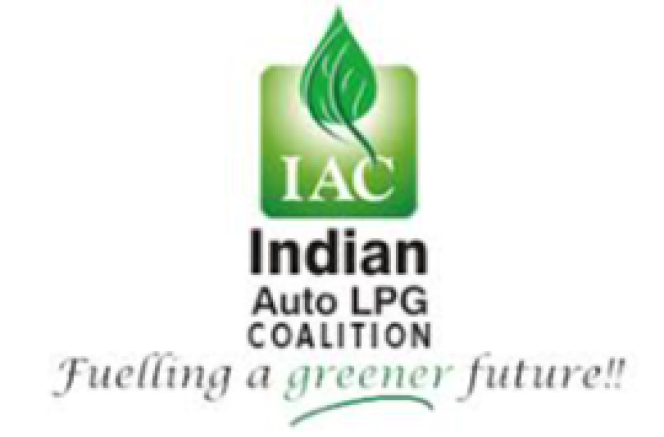
The Indian Auto LPG Coalition (IAC), nodal body for the promotion of Auto LPG in India, has issued a statement, asking why special attention is reserved only for electric vehicles while overlooking auto LPG.
Days ago, the government announced another allocation of INR 1,000 crore for the development and installation of charging infrastructure under the phase II of Faster Adoption and Manufacturing of Hybrid and Electric Vehicle (FAME) scheme. Sometime in the middle of the year, the government had extended the second phase of FAME by two years until March 2024.
Suyash Gupta, Director General, Indian Auto LPG Coalition, said, “While we certainly welcome the long-term focus of government to set the ball rolling for a minimally carbon-intensive vehicular fuel policy and of course, the tilt towards electric vehicles would be a part of that vision, it is totally baffling that the government continues to ignore the immediate potential that auto LPG holds out in all respects as compared to electric mobility. Talking of infrastructure, government’s plans to set up 4500 EV charging stations across the country is woefully inadequate since there is a need for at least 4 lakh charging stations, 100-times that target, in order to meet its own target of having 2 million EVs on the roads by 2026. In contrast, auto LPG already has almost 1500 stations for refilling across 600 cities in the country. And that too without almost any government support. Further, India’s import dependence on lithium-ion batteries, without which EVs are an absolute non-starter, is unlikely to ease immediately even with government’s full policy push. With China dominating the world market for the raw material, it becomes even more complicated and unpredictable. On the other hand, thanks to the drive for household consumption of LPG, an extensive infrastructure exists in the country from before. With 2.5 million auto LPG vehicles already running on Indian roads, it makes almost perfect sense to give an instant policy boost to this fuel.”
Gupta added, “Cost-wise, instead of buying expensive EVs, it becomes far easier for a consumer to get their existing vehicles retrofitted with LPG conversion kits. All that the government needs to do is to ease the Type Approval norms governing the retro-fitment of LPG/CNG conversion kits and bring them in line with the European norms. Currently, the Indian rule to renew Type approvals for auto LPG conversion kits every three years is hugely cost-prohibitive as well as a disincentive and a deterrent from both manufacturer and consumer standpoints. The government must also consider shifting the GST slabs of conversion kits from 28 to 18 percent and of auto LPG from 18 percent to 5 percent with a view to stimulate demand on the ground. In fact, even environmentally speaking, electric vehicles are not really as environmentally friendly as they are being made to be especially in the immediate term. Almost 60% of electricity in the country is still produced by carbon-emitting fossil fuel-based sources. On the other hand, auto LPG has a zero global warming potential with negligible emissions of nitrogen oxides and particulate matter.” (MT)
Subaru Begins Production Of BEVs At Upgraded Gunma Yajima Plant
- By MT Bureau
- February 04, 2026
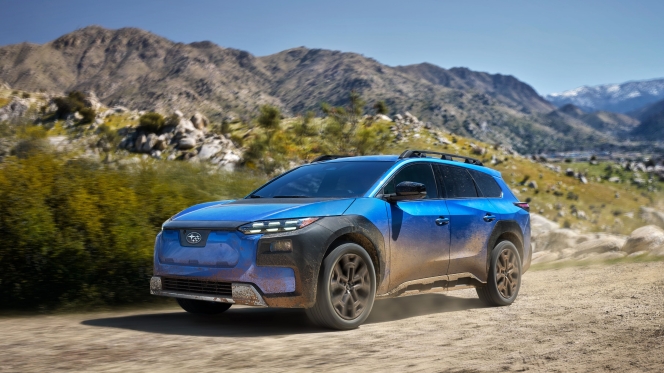
Marking a significant step in its electrification strategy, Subaru Corporation has initiated domestic production of Battery Electric Vehicles at its Gunma Yajima Plant. This launch coincides with the finalisation of extensive upgrades to the plant’s production systems, a project commenced in August 2025. Central to these enhancements is a new, flexible assembly line engineered to manufacture the all-new E-Outback alongside traditional petrol and hybrid models within a single, integrated process. This approach leverages Subaru's established expertise in mixed-model production, allowing the company to adapt efficiently to the evolving automotive landscape.
The E-Outback itself represents a key milestone as Subaru's second global BEV, developed through a longstanding alliance with Toyota Motor Corporation. This partnership, celebrating its twentieth anniversary in 2025, has grown to encompass collaborative efforts in development, production and supply chain management. The recent manufacturing advancements are a direct result of deepened cooperation in electrification technologies, combined with continuous refinement of Subaru’s own manufacturing, or monozukuri, capabilities.
Looking forward, Subaru intends to further increase manufacturing flexibility. This focus aims to achieve greater production efficiency and development agility, thereby strengthening the company's ability to respond to market shifts and bolster its overall competitiveness. The Subaru E-Outback is scheduled for introduction in the United Kingdom during Summer 2026, with full specifications to be disclosed nearer the launch date.
- VinFast
- Investor of the Year
- Urban Electric Vehicle of the Year
- VinFast VF 7
- Motor Vikatan Awards 2026
VinFast Wins Dual Honours In India For Investment And Electric SUV
- By MT Bureau
- January 31, 2026
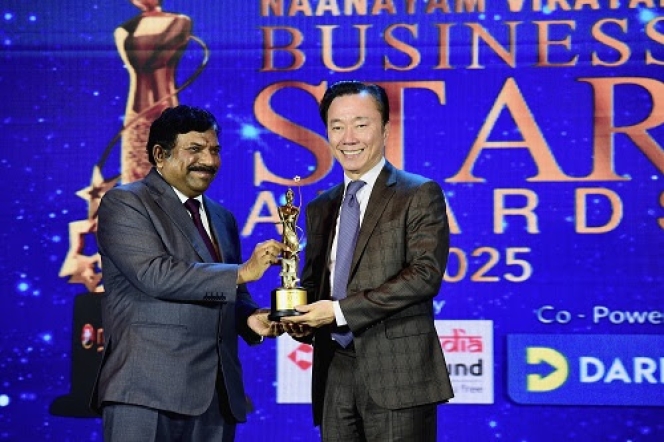
VinFast’s strategic progress in India has been further validated through recent accolades from the influential Vikatan Group media network. The company was distinguished with two significant awards: one recognising its substantial investment commitment, and the other honouring its VF 7 model as the premier urban electric vehicle for 2026. These commendations underscore the brand’s deepening integration into the Indian automotive sector, highlighting both its industrial strategy and its product relevance.
The title of Investor of the Year, conferred by Nanayam Vikatan business magazine, specifically acknowledges VinFast’s landmark commitment to establishing an electric vehicle manufacturing facility in Thoothukudi, Tamil Nadu. This project is noted not only for its scale and strategic clarity but also for its anticipated role in fostering a new industrial corridor, generating employment and bolstering the local supplier network. It aligns with national initiatives like Make in India and reflects confidence in the region’s manufacturing potential.
Concurrently, the VF 7 electric SUV was named Urban Electric Vehicle of the Year at the Motor Vikatan Awards 2026. This recognition from automotive experts underscores the model’s successful adaptation to India’s urban driving conditions, balancing design, performance, safety and comfort. It serves as a testament to VinFast’s product development focus and its localisation strategy aimed at meeting specific market demands.
As a respected media institution in South India with a legacy dating to 1926, the Vikatan Group’s awards carry considerable weight among businesses and consumers. These latest honours add to a growing list of VinFast’s achievements in the market, illustrating the convergence of its investment, manufacturing, and product efforts. Within a short timeframe, the company has employed a long-term strategy encompassing manufacturing, retail, charging infrastructure and after-sales services. Through this comprehensive approach and a focus on sustainable innovation, VinFast is steadily building its brand presence while contributing to India’s transition towards green mobility.
Pham Sanh Chau, CEO, VinFast Asia, said, “Being recognised in two important award categories demonstrates how VinFast is steadily building its position in India, not only through long term investment commitments but also through products developed to match local conditions and user needs. This recognition provides further momentum for us to accelerate implementation, expand the electric vehicle ecosystem, and maintain a long-term partnership with the Indian market.”
B Srinivasan, CEO, Vikatan Group, said, “VinFast India represents the new-age investor – bold in vision, swift in execution and deeply aligned with India’s growth story. By unravelling the true potential of the port city of Thoothukudi, VinFast India has helped create a conducive industrial ecosystem, played a positive role in employment generation and restored the city’s importance on India’s manufacturing map. Their investment is not just capital at work but confidence in India’s future.”
Blue Energy Motors And HPCL Forge Nationwide Pact For Electric Truck Battery Swapping
- By MT Bureau
- January 30, 2026
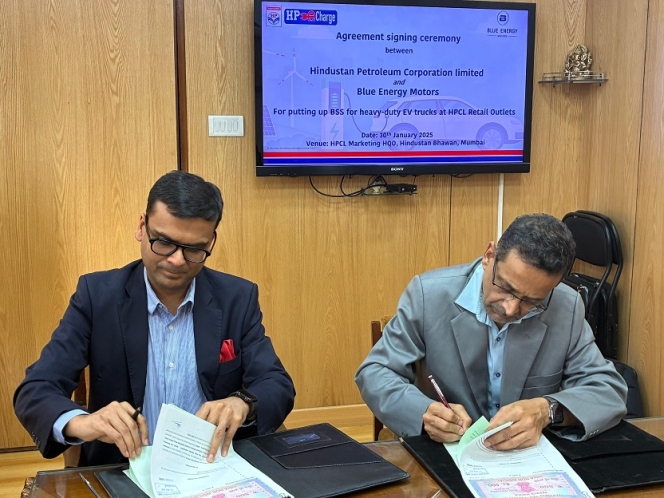
Blue Energy Motors and Hindustan Petroleum Corporation Limited (HPCL) have entered a strategic partnership to deploy Battery Swapping Stations for electric commercial trucks at select HPCL fuel outlets nationwide. This initiative leverages HPCL’s extensive network of over 24,400 retail locations to create a widespread and convenient energy infrastructure for freight operators. By situating swap stations within established fuelling hubs, the collaboration seeks to make electric mobility a practical and scalable reality for India’s logistics sector.
The core advantage of battery swapping lies in its dramatic reduction of energy replenishment time to under five minutes, minimising vehicle downtime compared to conventional charging. For fleet operators, this efficiency translates into higher vehicle utilisation, improved productivity and more predictable scheduling. Furthermore, a growing and accessible network of swap stations alleviates range anxiety, enabling electric heavy-duty trucks to confidently undertake longer routes and multiple shifts.
As India advances its green transportation goals, this alliance holds significant strategic value. HPCL’s vast retail footprint, which already supports over 5,400 EV charging points under its HP e-Charge brand, offers a ready platform for rapid infrastructure deployment across key freight corridors. Blue Energy Motors, a pioneer in zero-emission freight solutions, brings its expertise in electric commercial vehicles, exemplified by its launch of India’s first electric freight corridor. Together, the companies aim to accelerate electric vehicle adoption by directly addressing the operational needs of commercial fleets, thereby strengthening the long-term development of sustainable freight transport in the country.
- Eicher Trucks and Buses
- VE Commercial Vehicles
- VECV
- India Book of Records
- IBR
- Eicher Pro X
- Vinod Aggarwal
- SS Gill
- Abhishek Chaudhary
Eicher Pro X EV Completes Kashmir To Kanyakumari Journey In 6 Days
- By MT Bureau
- January 28, 2026
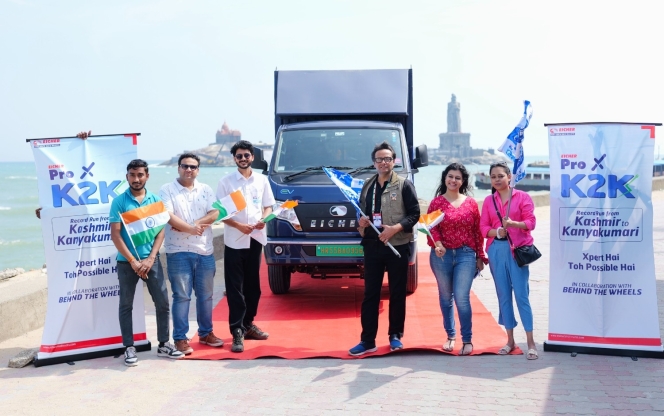
Eicher Trucks and Buses, part of VE Commercial Vehicles (VECV), has completed a journey from Kashmir to Kanyakumari using its Eicher Pro X EV.
The record verified by the India Book of Records (IBR), saw the electric vehicle cover over 4,000 kilometres in 6 days under loaded conditions. The run commenced in Srinagar on 20 January 2026 and concluded in Kanyakumari on 26 January 2026, traversing the Himalayas, plains and the Deccan Plateau.
Throughout the expedition, the vehicle utilised public chargers located via the MyEicher App. An adjudicator from the India Book of Records accompanied the truck to monitor route compliance, load, distance and charging stops. The mission served as a demonstration of electric vehicle endurance across diverse altitudes and climates to validate the technology for logistics corridors.
The journey was intended to show that electric commercial vehicles can operate beyond short-haul deliveries. By maintaining performance across hilly and coastal routes, the Pro X EV aimed to establish total cost of ownership (TCO) benefits and maintenance predictability for fleet operators. The successful completion of the route suggests that current charging infrastructure can support long-haul electric freight movement.
Vinod Aggarwal, MD & CEO, VE Commercial Vehicles, said, “For more than four decades, Eicher trucks and Buses have earned customer trust through leadership in fuel efficiency and application-specific engineering. The record-setting performance of the Eicher Pro X reinforces our unwavering focus on application excellence, reliability, and performance, anchored in robust product development and manufacturing capabilities, and enabled by a customer-centric, pan-India commercial and dealer network. I commend the entire Eicher team for achieving these well-deserved records”.
SS Gill, Chief Commercial Officer, VE Commercial Vehicles, said, “By covering the K2K route with a loaded Pro X EV, Eicher Trucks & Buses has proven that electric mobility is no longer restricted to short-haul, ‘last-mile’ deliveries. We are not just setting records, but through the strength of our service network and extensive dealer set-up, we are demonstrating that our EV technology is commercially viable, reliable, and has the range to serve as the backbone of India’s green logistics corridors”.
Abhishek Chaudhary, SVP – SCV Sales & Marketing, VE Commercial Vehicles, said, “The Eicher Pro X EV was put to the ultimate test – covering over 4000 kilometres across diverse climates and challenging altitudes. With this recognition from the India Book of Records we’ve moved beyond our own stringent testing benchmarks to real-world validation - Demonstrating that Eicher Pro X EV is a dependable partner for logistics movement across varied operations in India”.








Comments (0)
ADD COMMENT